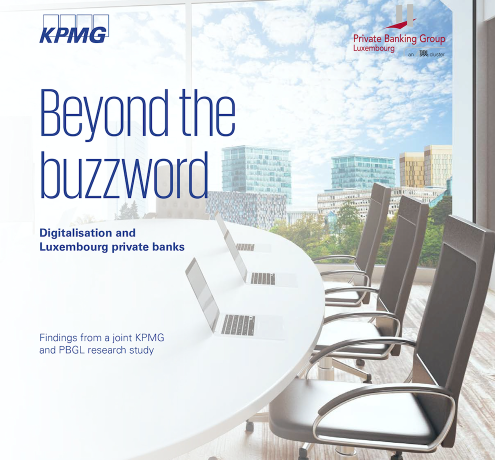DIGITAL BUSINESS
Inside the heart of Luxembourg private banks’ strategic ambitions
Over the past two decades, the Luxembourg private banking industry has frequently been said to be at a crossroads. In 2000, the Feira Agreement laid out for the first time the principle of “exchange of information” between tax authorities. Then the financial crises of 2002 and 2008 significantly altered the country’s banking landscape.
February 20, 2019

 Over the past two decades, the Luxembourg private banking industry has frequently been said to be at a crossroads. In 2000, the Feira Agreement laid out for the first time the principle of “exchange of information” between tax authorities. Then the financial crises of 2002 and 2008 significantly altered the country’s banking landscape. Strong regulatory pressure has since led to the introduction of multiple regulations lying behind esoteric abbreviations — such as CRD, MiFID or PSD — and this industry that had remained relatively untouched until recently has increasingly been affected by consolidation. Most recently, major players have been strategically repositioning themselves towards a more demanding clientele of HNWIs and UHNWIs who require products and services of an enhanced quality. So, Luxembourg private banks have indeed already encountered many a crossroads!
Over the past two decades, the Luxembourg private banking industry has frequently been said to be at a crossroads. In 2000, the Feira Agreement laid out for the first time the principle of “exchange of information” between tax authorities. Then the financial crises of 2002 and 2008 significantly altered the country’s banking landscape. Strong regulatory pressure has since led to the introduction of multiple regulations lying behind esoteric abbreviations — such as CRD, MiFID or PSD — and this industry that had remained relatively untouched until recently has increasingly been affected by consolidation. Most recently, major players have been strategically repositioning themselves towards a more demanding clientele of HNWIs and UHNWIs who require products and services of an enhanced quality. So, Luxembourg private banks have indeed already encountered many a crossroads!
Today they stand at another junction — that of “digital transformation” — and it looks rather more complex than its predecessors …What does it mean to “be digital” for a private bank? …Do we need to be a first mover? What do my clients want? …What is the competition doing? …In fact, what is the competition?
Ultimately, the digital transformation that hit retail banking a few years ago is now pervading the long-established private banking sector: What digital offerings can private banks propose to their clients? And what digital offerings do they want to propose to their clients?
In that context, KPMG and the Private Banking Group Luxembourg have initiated a comprehensive research on the digital transformation applied to the private banking industry in Luxembourg. This research, based among other on in-depth discussions with the major private banks present in Luxembourg, provides not only an assessment of the digital maturity and the digital ambitions of Luxembourg private banks, but also valuable insights on how they are reshaping their customer experience and sales approach for a new, digital environment.
Jean-Pascal Nepper, Partner in Management Consulting at KPMG Luxembourg explains: “What comes clearly out of the research is that almost all private banks in Luxembourg consider digital as key to the development of the sector in Luxembourg, but also agree on the fact that digital cannot—and will not—replace human interaction in a world where the private banker remains pivotal to the bank’s relationship with the client. Digital is instead seen as a push towards “augmenting” private bankers—that is, helping them increase and improve client acquisition and retention through a better customer experience”.
Pierre Etienne, Chairman of the Private Banking Group Luxembourg (PBGL), reinforces these ideas: “The private banking business in Luxembourg has faced considerable challenges in the last few year and has demonstrated its ability to adapt to the changes. I am confident that the sector will integrate the digitalization challenge and opportunity. Even though most private banks do rely on their parent banking groups for that matter, the unique wealth management expertise that Luxembourg has been able to build over the years will certainly benefit from any kind of digital initiatives and offerings”.
Main findings of the survey:
Luxembourg is known as a country of subsidiaries. Consequently, when it comes down to the definition of strategy—be it business, operational or digital—the often very close connections with parent companies lead to integrated decisions. It was therefore no surprise that, for almost all the private banks interviewed, their digital strategy is defined in close collaboration with their parent companies. In parallel, while the vast majority of private banks in Luxembourg consider digital to be key for the development of their sector, their degree of advancement in the definition — and, more importantly, the implementation — of their digital strategy shows discrepancies:
- A limited number of private banks in Luxembourg have extensively digitalized their customer experience, and fewer than a third have taken significant steps to implement new client journeys focusing on digital touchpoints. However, it is important to note that this seemingly intransigent stance is sometimes due to very consistent strategic positioning being maintained.
- Private banks in Luxembourg currently make rather limited use of technologies to improve their distribution and sales strategies. Those banks that have achieved a moderate level of digital availability for their products and services have done so through well-thought-out strategic positioning.
- The organizational maturity level of private banks in Luxembourg is usually well correlated with their development in terms of HR capabilities and culture. Those banks that have already adapted their organization and governance to today’s digital challenges tend also to have initiated corresponding changes in their talent attraction and development, and to have effected a shift in culture through channeled communication both internally and externally.
For more on the results of the survey, please click here: https://home.kpmg/lu/en/home/insights/2019/02/beyond-the-buzzword.html
For more on private banking at KPMG, please visit: https://www.kpmgprivatebanking.com/asp/.
For more on the ABBL Private Banking Group, please check: https://www.abbl.lu/abbl-clusters/private-banking-group/